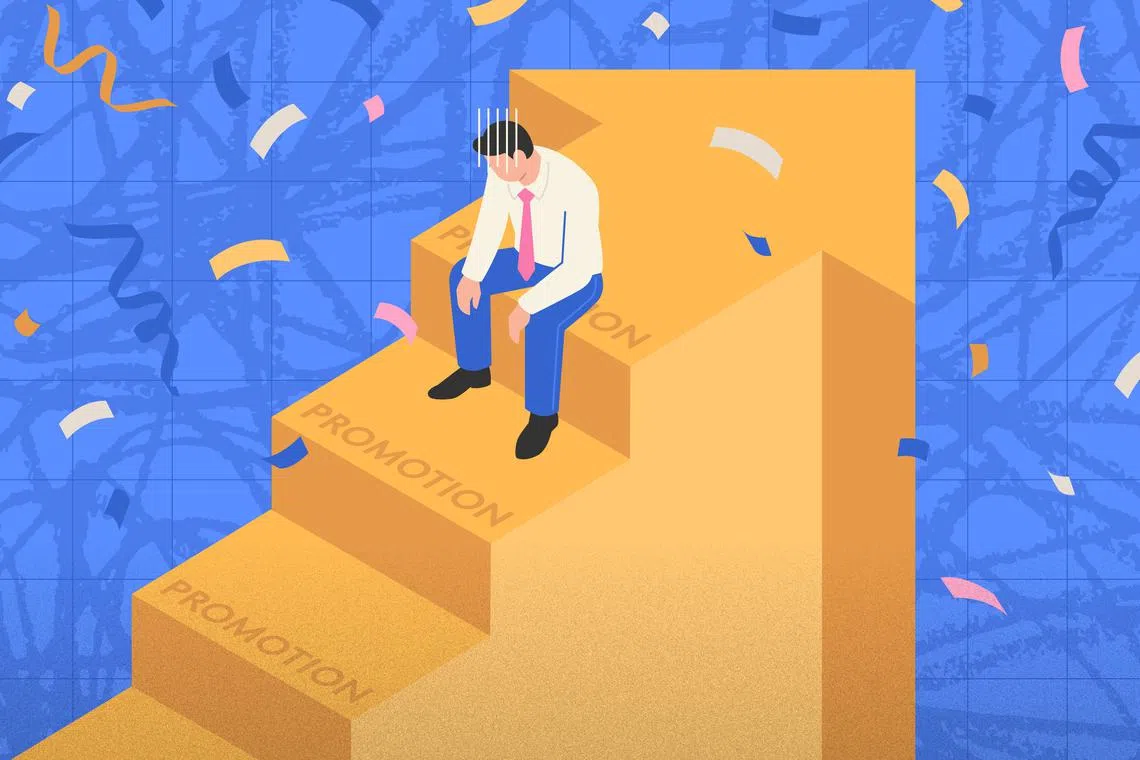askST Jobs: What to do when your motivation plummets after a promotion
Sign up now: Get tips on how to grow your career and money

A promotion often comes with expanded responsibilities and managing more complex tasks, says an organisational psychologist.
ST ILLUSTRATION: LEE YU HUI
In this series, manpower correspondent Tay Hong Yi offers practical answers to candid questions on navigating workplace challenges and getting ahead in your career. Get more tips by signing up to The Straits Times’ Headstart newsletter.
Q: I was recently promoted but I don’t feel the same drive as before. What should I do?
A: A promotion often comes with expanded responsibilities and managing more complex tasks, notes organisational psychologist Sherwin Chia.
The tasks can be more technical than before, involve more managing of other people, or even both, says Dr Chia, who is vice-dean of the S R Nathan School of Human Development at the Singapore University of Social Sciences.
These changes to your workload can affect your motivation in various ways.
To start with, you may feel overwhelmed by the increased amount of work.
You may also feel more unsettled, with greater uncertainty from new responsibilities that test your skills in new ways – or even require entirely new skills.
Some promotions also involve more administrative duties, which you might find less interesting than your previous role, Dr Chia says.
Recruitment veteran Michelle Koh says misaligned expectations are the most common reason she has been given by job seekers who face a loss in drive.
Another reason could be the “arrival fallacy” of overestimating how long the happiness of reaching a one-off milestone would last, says Ms Koh, managing director at executive search firm The Edge Partnership.
“At times, we put so much energy into achieving the promotion that once it happens, the rush wears off.”
Reaching such an external, one-off milestone is no substitute for the lasting fulfilment that comes from work you feel intrinsically motivated about on a day-to-day basis.
Ms Koh adds: “Another possible reason, and the one that is probably easier to resolve, is if you are simply tired from the effort it took to get there, and your system is asking for rest before it can gear up again.”
It is crucial to spot the signs of growing apathy. These include missed deadlines, a dip in work quality or a general slip in performance, Ms Koh notes.
“Sometimes it’s more subtle. You may appear less energetic in meetings, seeming disengaged, or simply lose that ‘bounce’ in your step,” she says.
“If the diminishing motivation isn’t addressed, it can also affect both immediate job performance and longer-term career prospects.
“Managers may begin to question whether the employee is ready for larger responsibilities or can be trusted with strategic projects. Over time, this perception could slow career progression and limit opportunities.”
Ms Koh suggests those who feel flagging motivation first explore internal opportunities for a better fit, rather than opting to resign right away.
“A lateral move, a project rotation or a role with a different scope could reignite motivation.”
Those who are unenthused about managing others and feel there is a lack of suitable internal moves can consider seeking out a sole contributor role that focuses on technical mastery instead.
While some are held back by the concern that stepping back from leadership responsibilities will signal weakness and limit one’s career growth, Ms Koh notes that careers are rarely linear.
“What may feel like a ‘step down’ could in fact extend your runway and help you sustain performance in the long run.
“The key is to be intentional: knowing what you need to thrive, and shaping your path around that, instead of making a reactive decision,” Ms Koh says.
Dr Chia suggests that those who feel burned out seek advice from a healthcare professional.
Aside from that, you could seek support from your colleagues and managers to cope with the transition.
This can include seeking advice on how to break down a large goal into smaller ones.
Dr Chia also encourages workers to seek out mentors or coaches, either via structured programmes if available, or informally.
On finding meaning in your new work, he says: “Some research has shown that being aware and reflective of how one’s work is impactful and significant can make work feel more meaningful.
“Awareness of one’s impactful work on others can be achieved through simple actions such as journalling these experiences.”
Small gestures such as helping colleagues with a simple task or providing a listening ear can also foster meaning.
Dr Chia says: “You got a promotion because your managers recognise your capability and see your potential. Getting back your drive takes time and effort, so be patient, persevere, and don’t forget to be kind to yourself.”
Have a question? Send it to askst@sph.com.sg



